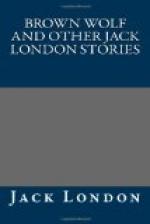“Who art thou to say what can be and what cannot be?”
“It stands to reason there cannot be so many people in one place. Their canoes would clutter the sea till there was no room. And they could empty the sea each day of its fish, and they would not all be fed.”
“So it would seem,” Nam-Bok made final answer; “yet it was so. With my own eyes I saw, and flung my stick away.” He yawned heavily and rose to his feet. “I have paddled far. The day has been long, and I am tired. Now I will sleep, and to-morrow we will have further talk upon the things I have seen.”
Bask-Wah-Wan, hobbling fearfully in advance, proud indeed, yet awed by her wonderful son, led him to her igloo and stowed him away among the greasy, ill-smelling furs. But the men lingered by the fire, and a council was held wherein was there much whispering and low-voiced discussion.
An hour passed, and a second, and Nam-Bok slept, and the talk went on. The evening sun dipped toward the northwest, and at eleven at night was nearly due north. Then it was that the head man and the bone-scratcher separated themselves from the council and aroused Nam-Bok. He blinked up into their faces and turned on his side to sleep again. Opee-Kwan gripped him by the arm and kindly but firmly shook his senses back into him.
“Come, Nam-Bok, arise!” he commanded. “It be time.”
“Another feast!” Nam-Bok cried. “Nay, I am not hungry. Go on with the eating and let me sleep.”
“Time to be gone!” Koogah thundered.
But Opee-Kwan spoke more softly. “Thou wast bidarka-mate with me when we were boys,” he said. “Together we first chased the seal and drew the salmon from the traps. And thou didst drag me back to life, Nam-Bok, when the sea closed over me and I was sucked down to the black rocks. Together we hungered and bore the chill of the frost, and together we crawled beneath the one fur and lay close to each other. And because of these things, and the kindness in which I stood to thee, it grieves me sore that thou shouldst return such a remarkable liar. We cannot understand, and our heads be dizzy with the things thou hast spoken. It is not good, and there has been much talk in the council. Wherefore we send thee away, that our heads may remain clear and strong and be not troubled by the unaccountable things.”
“These things thou speakest of be shadows,” Koogah took up the strain. “From the shadow-world thou hast brought them, and to the shadow-world thou must return them. Thy bidarka be ready, and the tribespeople wait. They may not sleep until thou art gone.”
Nam-Bok was perplexed, but hearkened to the voice of the head man.
“If thou art Nam-Bok,” Opee-Kwan was saying, “thou art a fearful and most wonderful liar; if thou art the shadow of Nam-Bok, then thou speakest of shadows, concerning which it is not good that living men have knowledge. This great village thou hast spoken of we deem the village of shadows. Therein flutter the souls of the dead; for the dead be many and the living few. The dead do not come back. Never have the dead come back—save thou with thy wonder-tales. It is not meet that the dead come back, and should we permit it, great trouble may be our portion.”




